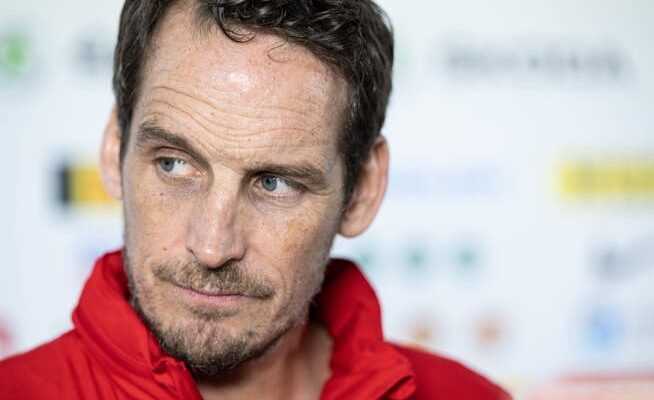After the bitter end at the Ice Hockey World Championships against the USA, national coach Patrick Fischer briefly lost his composure. And goalkeeper Leonardo Genoni surprises with ruthless self-criticism.
Rare outbreak: The national coach Patrick Fischer in Helsinki.
Before Patrick Fischer became national ice hockey coach in December 2016, he had just been fired from bottom of the table HC Lugano. Last with Lugano: That fueled skepticism about Fischer’s ability to hold this office. It had pissed him off how critical he was being looked at. But a few media training sessions helped him appear more confident. And after the silver medal in Copenhagen 2018, he was the radiant, undisputed figurehead of Swiss Ice Hockey anyway.
Now Fischer has not reached his own target at three world championships and two Olympic tournaments in a row. When a radio reporter from Ticino asked him on Thursday, after the bitter 3-0 loss to the USA in the quarter-finals of the World Cup, whether he wasn’t setting and formulating his goals too optimistically, Fischer briefly gave up. Would it be better if, like in the previous 20 years, you were satisfied with reaching the quarter-finals? Is that what the reporter wants? He shook his head.
It was a rare outburst from the coach. But there was something amazing about him. There are usually consequences when a coach misses targets five times in a row. It seems to be different with Fischer and Swiss Ice Hockey. There are a number of good reasons to keep fishermen. The fact that his nature and work have dynamized Swiss ice hockey in recent years. That his generously endowed contract is valid until 2024. That it is not clear which successor would fill this office better – not only as a coach, but also as an ambassador for Swiss ice hockey.
Switzerland is dependent on the NHL players
And yet the question arises as to what signal this sends out if it simply doesn’t matter a bit whether you can’t implement the guidelines you have set yourself for years. Outwardly, to the fans and sponsors. Above all, however, also internally, in the tête-à-tête with the players. Because what must not be forgotten: Switzerland’s clout stands and falls with its NHL players. With Nico Hischier, Timo Meier, Roman Josi, Kevin Fiala and Nino Niederreiter. They are players who are not dependent on the national team because the importance of the World Cup in North America can be found in a very small place.
They are honored that they often follow the call of the national team. But it is not a matter of course. They, too, are used to the buzzword “accountability” from their everyday work in the USA. It is one of his great strengths that Fischer has managed to keep the NHL players happy so far. But there will come a moment when a team falls at the same hurdle year after year when someone needs to take responsibility.
Fischer seemed combative immediately after the defeat. But there was also something helpless when he asked the group what could have been done better; he and his team would have undertaken and done everything. In fact, after this tournament, after seven wins from eight games, it would be unfair to question everything. But the fact that little worked again in the quarter-finals and that there was a sense of tension is not a good sign. Goalkeeper Leonardo Genoni said at his discretion the team “didn’t come close at all to progressing”. And he also said: “The first two goals we conceded are the result of mistakes that we can no longer make. That affects me too.” Something was missing, certainly the looseness, maybe the conviction to be able to turn the early deficit in a knockout game.
The dernière for Andres Ambühl
Fischer said he was incredibly proud of his team. He always says that, even after friendly wins against France. They have come a long way, until recently it was unthinkable that Switzerland would ever win games in such offensive glory as in Helsinki in the group phase. That’s true, but what hasn’t changed are the honorable quarter-final defeats, the conflicting tournament records. Fischer was asked whether the constant failure in crucial games could trigger something like a blockade, and his reply was: “I don’t believe in complexes.” At the next tournament in Tampere and Riga in 2023, he should have another chance to prove that he is right with this assessment.
The team will then probably look different than today – it would not be surprising if the coach continues to push the rejuvenation process that has already begun, for example with goalkeepers Leonardo Genoni and Reto Berra, who will be 35 and 36 years old in 2023. For the 38-year-old World Cup record player Andres Ambühl it should have been the last appearance with the national team. Other forces will have to help Switzerland achieve their World Cup goals once again.
